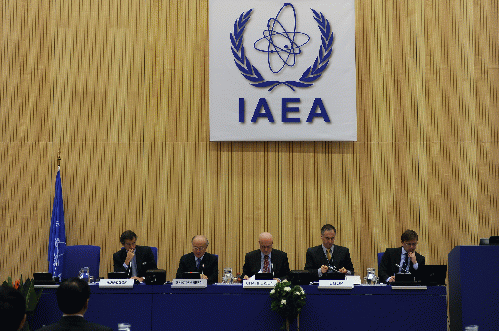From Consortium News

IAEA meeting on proposed Nuclear-Weapon-Free Zone in the Middle East. Vienna, Austria, 21-22 November 2011.
(Image by (Dean Calma / IAEA)) Details DMCA
The Iran nuclear deal that the Trump administration pulled out of last year is on the verge of collapse.
The National Security and Foreign Policy Committee of the Iranian Parliament last Tuesday ratified a motion that required the Iranian government to cease its voluntary implementation of its Additional Protocol agreement with the International Atomic Energy Agency (IAEA).
The motion, if turned into law, would represent a death knell to the 2015 Joint Comprehensive Program of Action (JCPOA), the groundbreaking agreement between Iran and the United States, Great Britain, France, Russia, China, Germany, and the European Union to end the crisis surrounding Iran's nuclear program.
There is still time before the matter could be brought up for a vote; indeed, the committee is scheduled to hold a hearing on July 6, and has invited Foreign Minister Mohammad-Javad Zarif and Nuclear Chief Ali-Akbar Salehi to testify.
IAEA Resolution
The current crisis over Iran's nuclear program was triggered by the IAEA Board of Governors, which on June 19 passed a resolution expressing its "serious concern" over Iran's refusal to provide "access to the Agency under the Additional Protocol to two locations." The resolution said that "discussions engaged, for almost a year, to clarify Agency questions related to possible undeclared nuclear material and nuclear related activities in Iran have not led to progress."
The Board of Governors resolution required that "Iran shall cooperate fully and in a timely manner" with the IAEA in implementing its Comprehensive Safeguards Agreement and Additional Protocol, including "by providing access." The resolution reaffirmed that such "cooperation and implementation are essential for the IAEA to reach the Broader Conclusion that all nuclear material in Iran remains in peaceful activities."
The First Three Years of the Deal
The Board of Governor's June 19 resolution did not occur in a vacuum. For the first three years of the JCPOA's implementation, Iran was repeatedly certified as being in full compliance with all of its obligations, including granting IAEA inspector's access to facilities and locations mandated by the additional protocol.
The protocol is an expanded set of requirements for information and access between Iran and the IAEA. It assists IAEA inspectors to confirm that states are using nuclear material for solely peaceful purposes. The protocol is a voluntary agreement and is independently constructed between a state and the IAEA.
Iran negotiated its additional protocol with the IAEA in 2003, which was signed but never ratified. Nevertheless, Iran implemented the protocol on a voluntary basis from 2003 to 2006 before ending its cooperation in the face of allegations that Iran was cheating.
Iran and the IAEA then entered a decade-long confrontation, which was only resolved with the implementation of the JCPOA nuclear deal, which was unanimously endorsed by the UN Security Council in resolution 2231 on July 20, 2015. That made the JCPOA binding under both international and U.S. constitutional law.
The nuclear deal established a road map, framed by mutually binding commitments, that took Iran from zero tolerance over nuclear enrichment, to a time when Iran would be able to enrich uranium for peaceful purposes without restriction, as long as the IAEA confirmed that Iran's entire nuclear program had no military intentions. According to the deal, Iran would be subjected to stringent safeguards inspections that included the additional protocol.
(Note: You can view every article as one long page if you sign up as an Advocate Member, or higher).





